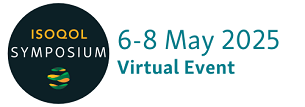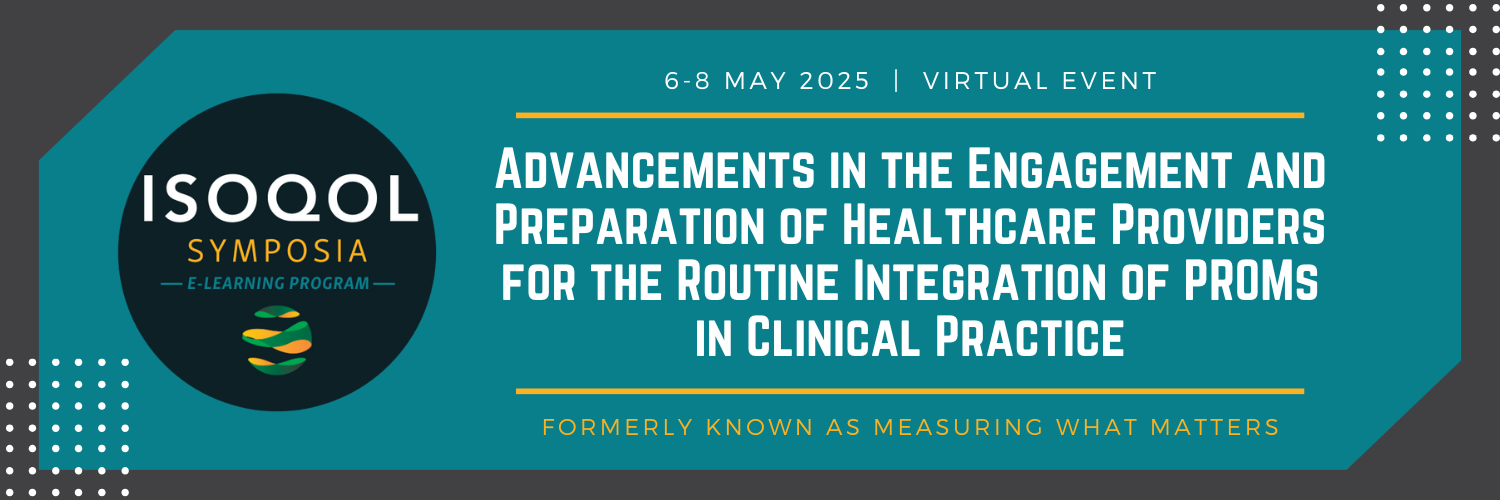Register today to attend the ISOQOL 1st Virtual Symposium, an event focused on challenges that healthcare providers (HCPs) encounter in the integration of patient-reported outcome measures (PROMs) into routine practice.
Scheduled for three half-days from 6-8 May 2025, this virtual event will consist of panel discussions, presentations, an interactive online activity, real world case studies, and live attendee engagement and interaction with the speakers.
Session Highlight
Session 4: Identifying Environmental Opportunities, Resources, and Cues that can Aid HCPs Adoption of PROMs
Implementation does not happen in a vacuum, and the opportunity component of COM-B considers the local environment factors. In this session, we review known environmental factors that often impede HCP use of PROMs, including organizational operations (infrastructure and logistics), physical resources (e.g., clinic layout), technological resources (e.g., electronic medical records systems), people resources (e.g., clinic support staff). Furthermore, the dynamic interplay between HCPs and their surroundings/practice environment is a key influential factor. To reduce the burden on providers, implementors require foresight to address environmental impacts such as workload, time, workflow, and usability of the PROM(s). Multiple practice examples will be shared of how environmental barriers can be redirected to become environmental support via thoughtful implementation design.
Session Speakers:

Elizabeth J. Austin, PhD MPH
Department of Health Systems and Population Health, University of Washington
Elizabeth J. Austin, PhD MPH, is a Senior Research Scientist in the Department of Health Systems and Population Health at the University of Washington. She conducts a variety of evaluative and implementation-focused research that targets patient-provider interactions, addressing the informatics, workflow, organizational elements that can lead to more patient-centered clinical decision-making. She previously served as Co-Chair of the ISOQOL Clinical Practice Special Interest Group and has co-led four national/international workshops on PRO implementation in clinical practice. She has implemented patient-reported outcome measures in surgical, primary care, pediatric, and behavioral health care settings across the U.S and led the development of a toolkit to guide health systems in electronic PRO implementation (epros.becertain.org).

Lotte Haverman, PhD
Amsterdam University Medical Center
Dr. Lotte Haverman is a medical psychologist by training and associate professor at Amsterdam UMC, the Netherlands. Her research focuses on identifying barriers and facilitators to the use of Patient-Reported Outcome Measures (PROMs) in clinical practice, across diverse patient groups including children, adults, and parents. Her work involves developing and validating PROMs, as well as implementing optimizing methods for providing feedback to clinicians. One of her recent projects focuses on integrating PROMs into shared decision-making in the clinical setting. Dr. Haverman also serves as director of the Amsterdam PROM Expertise Center and the KLIK PROM portal (www.hetklikt.nu), both dedicated to the real-world implementation of ePROMs.

Selina Limmen, MSc
Amsterdam University Medical Center
Selina holds a master’s degree in pediatric physical therapy. After gaining experience in the field, she began her PhD at Emma Children’s Hospital. Her research focuses on implementing shared decision-making (SDM) using patient-reported outcome measures (PROMs) in pediatric physical therapy. As part of her project, she developed a core set of generic PRO(M)s for this setting, investigated the psychometric properties of these PROMs, conducted research on SDM, and implemented both the core set of PROMs and SDM through the KLIK PROM portal in 12 affiliated pediatric physical therapy practices. She trained over 50 therapists in SDM with the use of PROMs.

The International Society for Quality of Life Research (ISOQOL) is a global community of researchers, clinicians, health care professionals, industry professionals, consultants, and patient research partners advancing health related quality of life research (HRQL).
Together, we are creating a future in which patient perspective is integral to health research, care and policy.


